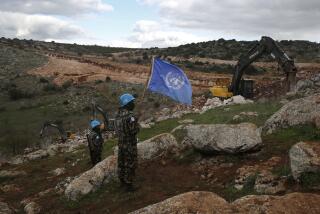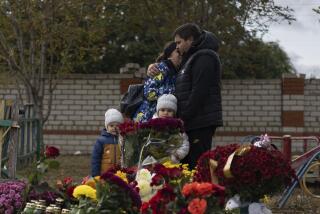In Syria, U.N. inspectors return to site of alleged attack
- Share via
BEIRUT — United Nations chemical weapons inspectors on Wednesday visited an area east of Damascus allegedly attacked with chemical weapons last week, and the world body’s leader said the team needed four days on the ground to complete its work.
Meanwhile, Lakhdar Brahimi, the envoy to Syria for the U.N. and the Arab League, told reporters Wednesday that international law required U.N. Security Council approval for any military strike tied to Syria’s alleged use of chemical weapons. The United States and its allies are said to be preparing an attack without a go-ahead from the world body, which has long been divided on Syria.
On Wednesday, the U.N. inspection team visited the Ghouta region northeast of the Syrian capital, which was the zone heaviest hit in the alleged poison gas bombardment. Opposition activists said hundreds died in several towns in the sprawling region, long a hotbed of the rebellion against the government of President Bashar Assad.
The U.N. team’s visit was “successful” and the staffers returned to Damascus, Farhan Haq, a U.N. spokesman, said via email from New York. Further details about what the inspectors found were not immediately available. Their tasks include taking statements from victims and witnesses and gathering samples to be tested for chemical traces.
In the Hague, U.N. Secretary-General Ban Ki-moon said the inspectors needed four days at the sites to complete their work. He urged that the U.N. be given time to complete its task.
“It is essential to establish the facts,” Ban said. “The team needs time to do its job.”
The inspectors are working under a limited mandate to determine whether chemical substances were unleashed, not to apportion blame for who was behind the incident. They have now spent parts of two days visiting the Damascus suburbs, and could complete their field work by Friday.
The date of the inspectors’ potential departure from Syria has taken on added significance because some commentators have suggested that U.S. and allied forces would likely hold off attacking Syria while U.N. personnel were still on the ground.
The U.S., Britain and France are reportedly readying forces for a punitive strike on Syrian government targets in retaliation for the alleged chemical attack.
Syrian authorities have denied gassing their own people and accused the rebels of releasing toxic substances in an effort to frame the government and draw international intervention. The opposition has rejected any responsibility for an incident that largely targeted rebel-controlled suburbs of the Syrian capital.
In Geneva, Brahimi, the special representative for Syria, said that “some kind of substance” was apparently used in the mass-casualty attacks of Aug. 21. He did not elaborate and it was unclear if he was basing his assessment on media accounts or inside information.
But he stressed the momentous significance of last week’s events, saying that the more than 2-year-old Syria crisis could now be spoken of in terms of “before Aug. 21 and after Aug. 21.”
Neither the United States, France nor Britain has shared evidence with the U.N. implicating the Syrian government, Brahimi said.
“We will be very, very, very interested to hear from them what this evidence they have is,” Brahimi told reporters.
As Washington and its allies prepared for a prospective attack on Syria, possibly without a U.N. mandate, Brahimi said world-body action would be a legal prerequisite for military operation.
“I do know that President Obama and the American administration are not known to be trigger-happy,” Brahimi said. “What they will decide I don’t know. But certainly international law is very clear, the Security Council has to be brought in.”
ALSO:
Britain awaits another birth - this one a panda
Brazilian sees museum as ‘the Disney of the future’
Iranian parliament pursuing lawsuit against CIA for 1953 coup
Twitter: @mcdneville
More to Read
Sign up for Essential California
The most important California stories and recommendations in your inbox every morning.
You may occasionally receive promotional content from the Los Angeles Times.










